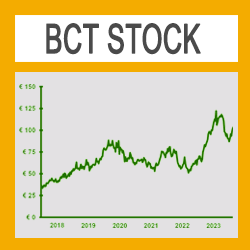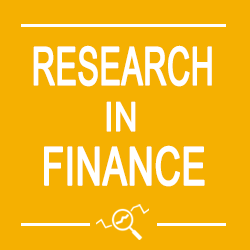
New on SimTrade?
Register for free and join the SimTrade community.
By connecting to this website you accept Terms of use.
 BioCellTech
BioCellTech
You work for BioCellTech, a biotech company specialising in the development of drugs aimed at curing or alleviating the effects of various virus-based human diseases. During the simulation, you will receive news about BioCellTech, a company whose shares are traded on the SimTrade platform. You will be able to buy and sell shares of BioCellTech. Your goal is to maximize your trading gain at the end of the simulation. At the start of the simulation, you own an account consisting of €100,000 in cash and 1,000 BioCellTech shares. Given yesterday’s closing price of €100.55, the total value of your position is more than €200,000. The duration of the simulation is initially set to 10 minutes which corresponds to a 24-hour trading day. Using the timeline, you can increase or decrease the simulation speed at any time. You must complete the simulation for it to be valid for your grade. |
Which trades does the law prohibit? Buying or selling stocks (technically known as “trading”) can be legal or illegal. Trading based on public information is legal, even if the trader is the CEO, an employee of the firm or any other insider. Typically, a CEO may decide to buy 1,000 shares of the corporation she works for. Trading based on nonpublic information that is likely to impact the share price (for examples information on earnings and merger plans) amounts to insider trading: it is illegal. It is not uncommon that the CEO, employees of the firm, as well as consultants, lawyers, investment bankers and other service providers for the issuer, know about a joint-venture project, decreasing sales, or any other private information about the issuer, before it becomes available to the public. Penalties for insider trading are severe:
IMPORTANT: As an employee of BioCellTech, every time you trade in BioCellTech’s shares, you are required to comply with law. Insider trading is a serious criminal offense. It is one of the most severely punished. Chances of being caught are substantial: the market authority constantly watches the trading activity of financial markets. Its investigation team relies on sophisticated algorithms and can access private communications (mobile phone, social networks, etc.). Our policy is designed to protect you and the Company. As an employee of the Company you will have access from time to time to insider information: make sure you do not use it for illegal purposes. Illustration: the American media personality Martha Stewart sold shares of ImClone the day before the Drugs Administration announced it would not approve a new drug. Stewart had received information from ImClone’s CEO, Samuel Waksal. The share price fell sharply upon the announcement and Stewart made nearly $250,000 on the sale. Martha Stewart was convicted for illegal insider trading; she was sentenced to five months of prison time and five months of house arrest, and significant monetary fines. After her release, she was barred from acting as company director for five years. |
Which trades does the law prohibit? Buying or selling stocks (technically known as “trading”) can be legal or illegal. Trading based on public information is legal, even if the trader is the CEO, an employee of the firm or any other insider. Typically, a CEO may decide to buy 1,000 shares of the corporation she works for. Trading based on nonpublic information that is likely to impact the share price (for examples information on earnings and merger plans) amounts to insider trading: it is illegal. It is not uncommon that the CEO, employees of the firm, as well as consultants, lawyers, investment bankers and other service providers for the issuer, know about a joint-venture project, decreasing sales, or any other private information about the issuer, before it becomes available to the public. Penalties for insider trading are severe:
IMPORTANT: As an employee of BioCellTech, every time you trade in BioCellTech’s shares, you are required to comply with law and also with BioCellTech’s ethical, moral and professional standards. Insider trading is not only a criminal offense but is also contrary to the ethical, moral and professional standards required of the Company. Our policy is designed to protect you and the Company. As an employee of the Company you will from time to time have access to insider information: make sure you do not use it for illegal or unethical purposes. Illustration: The American media personality Martha Stewart sold shares of ImClone the day before the Drugs Administration announced it would not approve a new drug. Stewart had received information from ImClone’s CEO, Samuel Waksal. The share price fell sharply upon the announcement, and Stewart made nearly $250,000 on the sale. Martha Stewart was convicted for illegal insider trading. Before the scandal, the general public associated Martha Stewart and her businesses with credibility and honesty. Upon conviction Marth Stewart’s brands were ranked worse than Enron’s. After her release, as a result of this corporate misconduct, her personal and professional image was tainted. |
Which trades does the law prohibit? Buying or selling stocks (technically known as “trading”) can be legal or illegal. Trading based on public information is legal, even if the trader is the CEO, an employee of the firm or any other insider. Typically, a CEO may decide to buy 1,000 shares of the corporation she works for. Trading based on nonpublic information that is likely to impact the share price (for examples information on earnings and merger plans) amounts to insider trading: it is illegal. It is not uncommon that the CEO, employees of the firm, as well as consultants, lawyers, investment bankers and other service providers for the issuer, know about a joint-venture project, decreasing sales, or any other private information about the issuer, before it becomes available to the public. Penalties for insider trading are severe:
▢ By checking this box I commit that I will not breach any of the requirements applying to lawful trading. |
Which trades does the law prohibit? Buying or selling stocks (technically known as “trading”) can be legal or illegal. Trading based on public information is legal, even if the trader is the CEO, an employee of the firm or any other insider. Typically, a CEO may decide to buy 1,000 shares of the corporation she works for. Trading based on nonpublic information that is likely to impact the share price (for examples information on earnings and merger plans) amounts to insider trading: it is illegal. It is not uncommon that the CEO, employees of the firm, as well as consultants, lawyers, investment bankers and other service providers for the issuer, know about a joint-venture project, decreasing sales, or any other private information about the issuer, before it becomes available to the public. Penalties for insider trading are severe:
IMPORTANT: as a trader you might find it difficult to visualize who are the victims of illegal insider trading. But there are some damaging effects:
|
Which trades does the law prohibit? Buying or selling stocks (technically known as “trading”) can be legal or illegal. Trading based on public information is legal, even if the trader is the CEO, an employee of the firm or any other insider. Typically, a CEO may decide to buy 1,000 shares of the corporation she works for. Trading based on nonpublic information that is likely to impact the share price (for examples information on earnings and merger plans) amounts to insider trading: it is illegal. It is not uncommon that the CEO, employees of the firm, as well as consultants, lawyers, investment bankers and other service providers for the issuer, know about a joint-venture project, decreasing sales, or any other private information about the issuer, before it becomes available to the public. Penalties for insider trading are severe:
Did you know? 99.9997% of market participants never engage in insider trading activity. |
Which trades does the law prohibit? Buying or selling stocks (technically known as “trading”) can be legal or illegal. Trading based on public information is legal, even if the trader is the CEO, an employee of the firm or any other insider. Typically, a CEO may decide to buy 1,000 shares of the corporation she works for. Trading based on nonpublic information that is likely to impact the share price (for examples information on earnings and merger plans) amounts to insider trading: it is illegal. It is not uncommon that the CEO, employees of the firm, as well as consultants, lawyers, investment bankers and other service providers for the issuer, know about a joint-venture project, decreasing sales, or any other private information about the issuer, before it becomes available to the public. Penalties for insider trading are severe:
The financial regulatory authority is continuously watching the trading activity of market participants. It has direct access to your trading data. |
Your grade for this simulation (100 points) takes into account the following elements:
|
|
BioCellTech evolves in a highly competitive environment, as many other biotechs are seeking to treat the same diseases as those on which BioCellTech focuses. An additional difficulty is that the development of a new drug requires substantial high upfront expenses and can take several years (up to ten or fifteen years for some of them). Furthermore, new products cannot be commercialised before having successfully gone through the control and authorisation processes required on relevant markets and territories. The Medecine and Drug Authority (MDA) is competent to deliver a marketing authorisation to companies which successfully went through a series of cumbersome tests and procedures aimed at verifying that the product is sufficiently safe to be commercialised. The success of a new product in BioCellTech’s sector is thus highly uncertain and a biotech’s share price can vary considerably depending on whether or not it manages to obtain the necessary marketing authorisations. A variety of other factors are likely to impact the success of these companies and their share price: good or bad perception of their products by the general public, efficacy of the products, personal qualities of the managers, relationships with suppliers, etc. Since its initial public offering two years ago, BioCellTech nevertheless had several commercial successes that led its share price to grow by 80%. Building on its past successes, BioCellTech is now considering launching new product lines. And now that its revenues are starting to grow and become more recurrent, it intends to raise debt from banks and capital markets. BioCellTech’s management also considers hiring new employees and expanding to new product markets and territories so that the company keeps scaling up. |
 |
After several decades of rapid growth, BioCellTech a successful initial public offering (IPO) in 2017. Since its introduction in the stock market, the stock price of BioCellTech (code: BCT) has steadily increased from its introductory price of €35. BCT shares are currently priced at approximately €50. |
 |
|
Today, several events related to BioCellTech will happen and may have a significant -positive or negative- impact on BCT share price. Information about these events qualifies as inside information until it becomes public and available to all market participants. Trading upon inside information before it gets public will allow you to make a profit, but it constitutes insider trading. Events of the day BioCellTech is waiting for the decision of the Medicine and Drug Authority (MDA) about the authorization for its new revolutionary product. The announcement of this decision by the MDA will have a significant impact on BCT share price: in case of a positive decision, the share price will sharply increase by 20% or more; in case of a negative decision, the share price will sharply decrease by 20% or more. BioCellTech will also announce its profits for the last quarter. If the realized profits are higher than the market forecast, BCT share price will increase following the company’s announcement. On the contrary, if the realized profits are lower than the market forecast, BCT share price will decrease. Public information / Inside information Events will happen during the trading session. You will be informed about each of these events before they occur, which means that you will hold inside information about them. Inside information privately disclosed to you will appear in red in the ticker tape at the top of the Trading page like this: INSERT GIF HERE Public information announced to all market participants will appear in black in the ticker tape at the top of the Trading page like this: INSERT GIF HERE Inside information privately disclosed to you will become public information announced to all market participants after three hours. If you trade after you receive inside information but before the information is publicly disclosed, you can expect to make a profit, but you have also engaged in insider trading. The entire trading session will last for 10 minutes. Your objective is to maximise the value of your portfolio (composed of a mix of cash and of BCT shares) by the end of the trading session. In case you engage in insider trading, you may or may not be caught and sanctioned. |
Teaching objectives: the BioCellTech simulation will enable you to become familiar with the key concept of market efficiency and how the news flow impacts the evolution of financial assets market prices. You will also discover key determinants of success for a company in the Food and Beverages sector. Learning goals: the BioCellTech simulation will also allow you to acquire the following skills:
Before or after launching this simulation, you can obtain additional information on the financial markets by taking courses related to the simulation. |
 |
The data regarding your trading activity and your answers to the survey in the BioCellTech simulation will be used as part of a research project on behavioral finance carried out by Geneviève Helleringer (ESSEC Business School & University of Oxford), Kosmas Kaprinis (IE University), François Longin (ESSEC Business School) and Paul Oudin (University of Oxford). The data will be used anonymously. |
 |
Professor Geneviève Helleringer
|
|
Kosmas Kaprinis
|
|
Professor François Longin
|
|
Paul Oudin
|